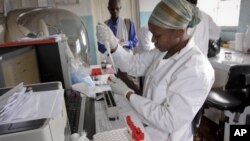In Kenya, the doctor’s union says it will suspend its strike only if the government begins negotiations to meet its demands “in good faith.”
The union has dismissed a government offer to increase the pay of medical professionals by $100, said Dr. Boniface Chitayi, the general secretary of Kenya’s Medical Practitioners, Pharmacists and Dentists Union (KMPDU).
KMPDU called for a nationwide strike after talks with the government ended in a stalemate.
Kenya’s media report chaos in public hospitals across the country because of the strike.
The government is reportedly scrambling to use medical students to fill the vacuum. Chitayi said the doctors view the government’s position as a refusal to boost quality healthcare delivery to its citizens.
“The doctors union holds that the state of healthcare in Kenya is unacceptable. Standards are going down and our indices are revealing that healthcare in Kenya is worse than it was 50 years ago or even 30 years ago,” said Chitayi. He called the situation “worrying because the government has not really taken keen interest in healthcare.”
Industry analysts say governments have often slashed budgetary allocations for healthcare, which they say contributes to the reportedly poor healthcare delivery. Chitayi agrees with the conclusion.
“Over the last 10 years, the government…instead of increasing the healthcare budget…has reduced [it]. From the year 2001-2011, the budget has decreased from 9.1 percent to 6.6 percent,” said Chitayi.
He said the administration seems uninterested in addressing their concerns.
“During these negotiations the government embarked upon activities that undermined the union and the abilities of the negotiation team to proceed in good faith and in good time,” said Chitayi. “There were transfers of union officials; there were stoppages of salaries for many doctors. All these developments led to the breakdown of the talks.”
Kenya’s medical services minister, Peter Anyang' Nyong’o, told VOA he is willing to listen to the doctors. He also says the government already has policies in place that are improving the lives of medical professionals.
“We have already worked on a very strategic investment programs for the health sector, which we discussed at the prime minister’s committee last Tuesday,” said Nyong’o. “We all agreed that what we need to do very soon is to have an investment conference on the health sector specifically to see how we can bring in private-public partnerships in certain areas so that government resources can be released to meet recurrent expenditure.”









